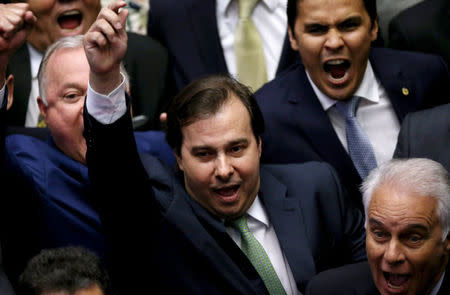Brazil speaker's re-election bodes well for Temer reforms
By Maria Carolina Marcello and Anthony Boadle BRASILIA (Reuters) - The lower house of Brazil's Congress re-elected an ideological ally of President Michel Temer as its speaker on Thursday, confirming his government's majority and improving prospects for approval of unpopular fiscal austerity measures. Congressman Rodrigo Maia, of the center-right Democrats party, comfortably retained the speakership with 293 votes, well in excess of the required simple majority of 257. He has vowed to fast-track reform of Brazil's costly pension system, blamed for the growing budget deficit. Maia, 46, promised to make the lower chamber a "protagonist" in Temer's reform agenda and give priority to passage of a bill modernizing Brazil's outdated labor laws, a major demand from businessmen struggling with a two-year recession. The scion of a political family from Rio de Janeiro, Maia was first elected speaker last year when his predecessor Eduardo Cunha resigned to face a corruption trial. He quickly became a key supporter of Temer's efforts at fiscal discipline and helped speed approval of a 20-year cap on federal spending. Maia is first in line in the presidential succession because Brazil has had no vice president since Temer, who occupied that role, took over from impeached leftist leader Dilma Rousseff last year. His re-election came one day after Temer scored another win when Senators chose the leader of his PMDB party in the Senate, Eunicio Oliveira, to head the upper chamber, even garnering some votes from members of Rousseff's Workers Party. Temer urged lawmakers to pass his reforms to help pull Brazil from a crisis caused by overdrawn government accounts that had triggered recession and thrown millions out of work. "Pension reform is fundamental to restore health to public accounts, credibility to the economy and attract new investment to create jobs," he said in a message to Congress on the state of the country. CORRUPTION SCANDAL Oliveira and Maia face corruption allegations that could undermine their ability to drive through Temer's reforms. Both have been accused of taking bribes by defendants in the massive Car Wash graft investigation in explosive plea bargain statements that threaten to rock Brazil's political establishment and Temer's government. They deny any wrongdoing. The coming months in Congress are expected to be volatile with the release of plea deal testimony by executives of engineering conglomerate Odebrecht who have reportedly named dozens of politicians for receiving illegal payments, including members of Temer's cabinet. A federal deputy since 1999, Maia is known as an able consensus builder who has reached out for support from leftist lawmakers when needed, a skill that will come in handy in diluting opposition to pension and labor reforms. Social security expenditures have soared to an estimated 2.7 percent of gross domestic product (GDP) in 2017 from 0.3 percent in 1997, according to government estimates. In his most controversial proposal, Temer wants to set the minimum age of retirement to 65 years in a country where people work on average until the age of 54. Temer hopes to win approval for pension reform as quickly as possible to help lift the economy out of a recession entering its third year. A senior member of his economic team told Reuters the economy could grow more than 1 percent in 2017 if Congress approves the bill. Otherwise, it might continue to shrink. "Pension reform will be the real test," the official said. "If it doesn't work, we will have negative growth." (Reporting by Maria Carolina Marcello and Anthony Boadle; Editing by Daniel Flynn, David Gregorio and Lisa Shumaker)

 Yahoo News
Yahoo News 

